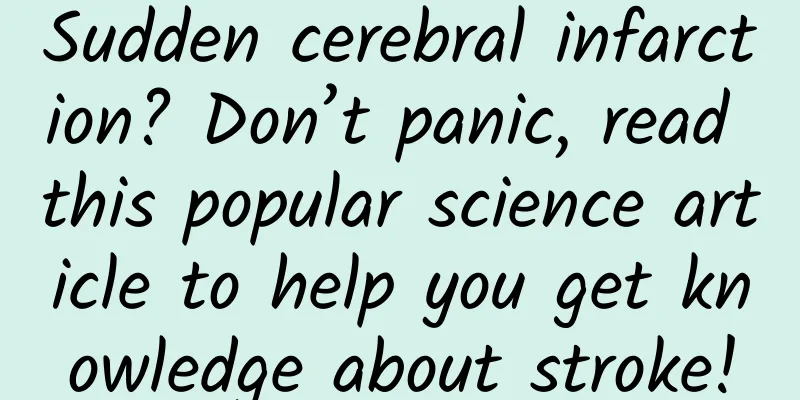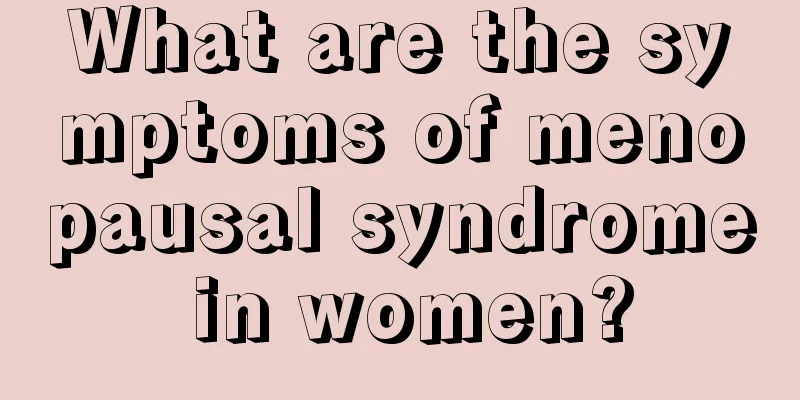Sudden cerebral infarction? Don’t panic, read this popular science article to help you get knowledge about stroke!

|
Stroke sounds like a very stressful disease, but it is actually a disease related to cerebrovascular accident. Simply put, it is a problem with the "pipeline" (blood vessels) that delivers nutrients to the brain, either blocked (ischemic stroke) or leaking (hemorrhagic stroke), causing brain cells to "go on strike" (lose function) because they cannot get "food and grass" (oxygen and nutrients). Even if there is a small problem with this "pipeline", the consequences can be serious! Because the brain controls our words, deeds, actions (actions, feelings, thoughts and behaviors), once it "strikes", it will affect these aspects. There are three main factors that affect the physical and mental state after a stroke: 1. The location of the "pipeline" blockage: "Pipelines" in different locations are responsible for supplying different brain areas, and the location of the blockage determines which functions will be affected. 2. The area and extent of brain cell "strike": the more and more severe the brain tissue on strike, the more serious the sequelae of stroke will be. 3. Type of stroke (ischemic vs. hemorrhagic): Just like a clogged water pipe and a leaking water pipe are two different faults, there are two types of stroke, and the treatments are also different. Ischemic stroke is the most common type, just like a "hair" (blood clot) stuck in a water pipe, blocking the "water flow" (blood), causing brain cells to "lack food" and "go on strike". Hemorrhagic stroke is a problem with the "pipeline" itself, which directly "leaks". The overflowing "water" will press on the surrounding brain cells, causing them to "go on strike" as well. Although this type is relatively rare, it is often more serious because the "leakage" will cause a larger range of "floods" (brain tissue damage). Stroke is no joke. If you notice any signs, you must seek medical attention immediately! The following symptoms are all "alarm signs" of stroke: 1. Sudden weakness in one arm or leg, and inability to exert force 2. Speech is lisp and speech is unclear 3. Sudden paralysis on one side of the face, crooked mouth corner 4. Sudden blurring of vision or even loss of vision 5. Severe headaches (but not all stroke patients will have headaches) 6. Dizziness (feeling dizzy) If you experience these symptoms, don't delay and call the emergency number immediately! Early detection and early treatment can greatly reduce the incidence of stroke sequelae and prevent the quality of life from being greatly affected. In order to stay away from stroke, we should also pay attention to taking good care of ourselves ! 1. Maintain a healthy lifestyle: exercise more, eat well, quit smoking and limit alcohol. 2. Check your body regularly and control your blood pressure, blood sugar and cholesterol. 3. If there is underlying vascular disease, active treatment should be sought. Remember, if you feel anything wrong with your body, seek medical attention immediately! |
Recommend
Why does your skin become better during menstruation?
Many female friends often feel that their skin co...
Can women eat donkey-hide gelatin cake during menstruation?
Every woman has a few days every month when she i...
How to treat breast lumps
Mammary glands are tissues that grow on the skin ...
Why do some people smoke a pack of cigarettes a day and live to be 90 without getting lung cancer?
November 17 is International Lung Cancer Day. Smo...
What will happen if you have sex with a condom during your period?
During menstruation, the cervix of women is open,...
Tumor markers CA125 and HE4: “double insurance” for ovarian cancer patients?
Author: Cui Liyan, Chief Physician, Peking Univer...
When will Wu Xin: The Monster Killer Season 3 be broadcast? Will Yue Qiluo be in Wu Xin: The Monster Killer Season 3?
Looking at the trailers of various dramas on majo...
Why does it hurt when my nipples are pinched?
The health of the breasts is directly related to ...
Why do some people always feel distant from others? Is a person who feels distant good or bad?
Many people may find that there is a type of pers...
Watching Yellow Spy during pregnancy will cause your baby to have precocious puberty
We all know that for a fetus, paying attention to...
Is it good for women to drink soy milk regularly?
Soy milk is made by grinding soybeans and boiling...
At what age does a woman's skin age?
Female friends pay the most attention to their sk...
What to do if you have severe back pain after giving birth
Generally speaking, back pain after childbirth is...
What are the benefits of drinking millet porridge for pregnant women?
Confinement is a characteristic of Chinese women,...
Are the prescriptions of glasses getting stronger the more you wear them? Don’t ignore these 4 ways to delay the progression of myopia!
Who told you to protect your eyes like this? I wa...









